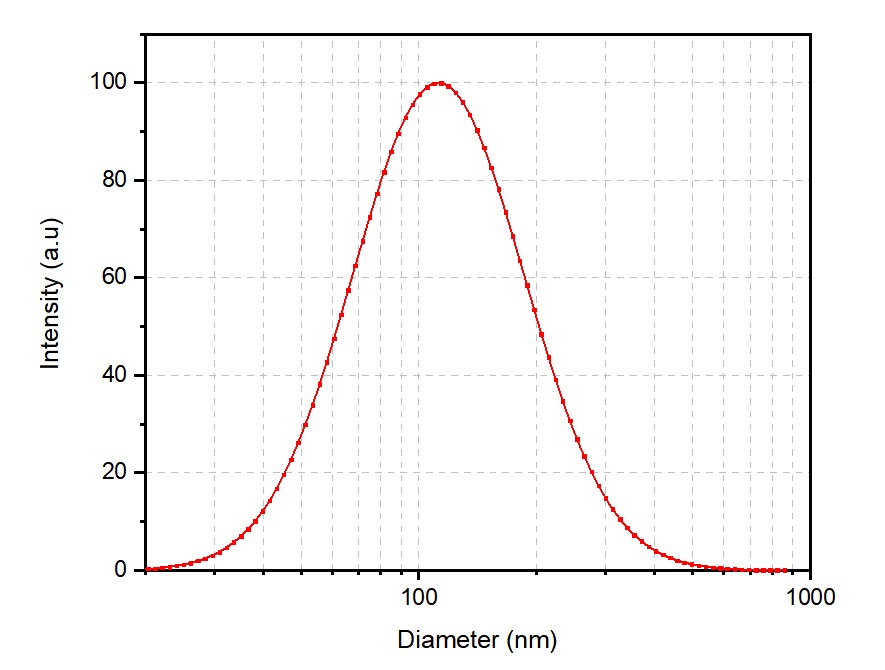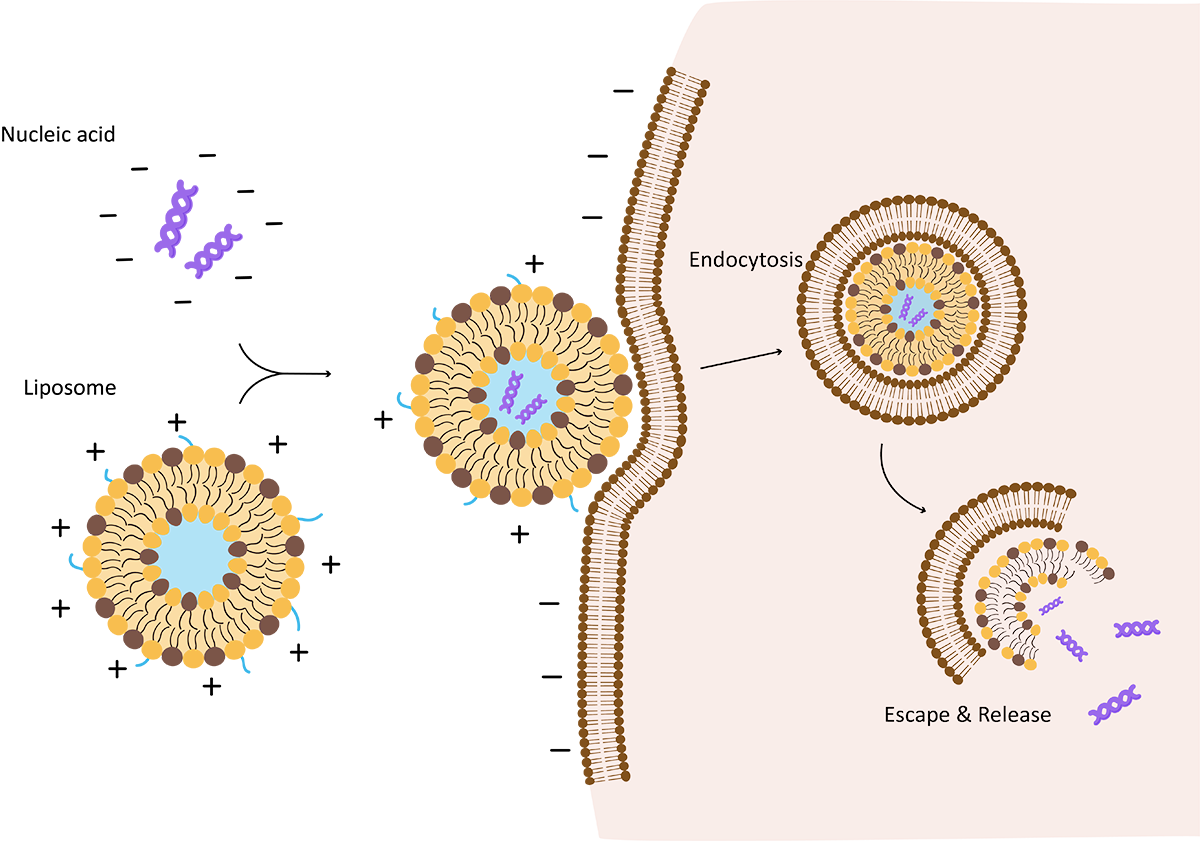Cationic liposomes are one of the most extensively researched non-viral vectors for gene delivery due to their unique ability to interact with negatively charged DNA and cell membranes. Creative Biolabs provides cutting-edge cationic liposome development services tailored to various research and clinical needs. These services offer researchers advanced solutions in gene delivery systems, allowing for efficient transfection and delivery of therapeutic agents into targeted cells.
The formulation of cationic liposomes involves the selection of specific lipid components that provide a positive charge to the surface of liposomes. This positive charge allows the liposomes to form complexes with negatively charged DNA, RNA, or other molecules, facilitating efficient delivery into cells. The most commonly used cationic lipids include:
Cationic liposomes are prepared through a multi-step process, starting with the dissolution of lipids in organic solvents, followed by the formation of lipid films, hydration, and encapsulation of the desired payload. The formulation process ensures optimal lipid-to-nucleic acid ratios, promoting high transfection efficiency and stability.
Creative Biolabs offers a range of services tailored to meet the diverse needs of researchers working with cationic liposomes. These services cover all aspects of cationic liposome development, from formulation to stability testing, ensuring that clients receive fully optimized and reliable liposomes for their research. If you are interested in our service, please feel free to contact us.
| Service | Description |
| Custom Lipid Synthesis | Synthesis of custom cationic lipids tailored to specific formulations, optimizing interaction with nucleic acids. |
| Basic Characterization | Evaluation of key physical properties such as size, zeta potential, and polydispersity to optimize liposome stability and transfection efficiency. |
| In Vitro Release Kinetics Analysis | Analysis of release kinetics to ensure controlled delivery of nucleic acids or drugs from cationic liposomes under physiological conditions. |
| Formulation Stability Evaluation | Stability testing to verify that cationic liposomes maintain their structural integrity, charge, and encapsulation efficiency over time. |
| Formulation Safety Evaluation | Safety evaluation to assess the cytotoxicity and biocompatibility of cationic liposome formulations, minimizing potential adverse effects. |
| Gene Expression and Silencing Analysis | Integration of cationic liposomes with gene expression and silencing assays to explore structure-function relationships in vitro. |
Creative Biolabs utilizes several advanced platforms and technologies to ensure the successful development of cationic liposomes. These platforms enhance the quality, precision, and scalability of liposome-based delivery systems.
Our platform's versatility and precision are demonstrated through successful projects. Explore how we've tackled complex formulation challenges.
Case 1: Calcein-Loaded Cationic Liposomes

At Creative Biolabs, we specialize in the design, development, and optimization of advanced cationic liposomes. Our team leverages cutting-edge technology and deep scientific expertise to create tailored lipid-based delivery systems for a wide range of applications, from nucleic acid delivery to targeted drug release.
Creative Biolabs stands out in the biotechnology industry for its expertise and the advantages it brings to the development of cationic liposomes. Our company's approach to liposome development is rooted in years of research and innovation, ensuring high-quality services tailored to specific research needs.
Cationic liposomes were first developed as a non-viral gene delivery method, offering a safer and more versatile alternative to viral vectors. Since their discovery, these liposomes have gained significant attention due to their unique ability to interact with negatively charged nucleic acids and cell membranes.
Cationic liposomes emerged in the 1960s when Alec D. Bangham discovered liposomes while studying lipid bilayers. In the 1980s, researchers like Philip Felgner introduced cationic lipids like DOTMA, which led to a revolution in gene transfection technologies. These liposomes are characterized by their positive surface charge, which allows them to bind with negatively charged DNA and RNA. Upon interacting with cell membranes, they facilitate the delivery of nucleic acids into cells via fusion or endocytosis, making them an ideal candidate for gene delivery research.
 Fig.1 Proposed mechanisms of cationic liposome condensation and uptake
Fig.1 Proposed mechanisms of cationic liposome condensation and uptake
Cationic liposomes have wide-ranging applications in various research fields, particularly in gene delivery and oncology research. Some key applications include:
| Application | Description |
| Gene Delivery | Efficient delivery of nucleic acids such as DNA, mRNA, and siRNA into cells for gene therapy and research. |
| Cancer Research | Targeted delivery to tumor cells, including anti-angiogenesis strategies by interacting with tumor vasculature. |
| Vaccine Development | Enhances immune responses by efficiently delivering antigens to target cells for vaccine research. |
In addition to its extensive service offerings, Creative Biolabs provides a selection of cationic liposome products that are widely used in gene delivery and drug research. Below are some key products:
| Product Name | Lipid Composition | Inquiry |
| DOTAP:DOPE Liposomes | DOTAP, DOPE | Inquiry |
| DOTAP Liposomes | DOTAP | Inquiry |
| DOTAP:Chol Liposomes | DOTAP, Chol | Inquiry |
| DOTAP:Chol:DOPE Liposomes | DOTAP, Chol, DOPE | Inquiry |
| DDAB Liposomes | DDAB | Inquiry |
| DDAB:Chol Liposomes | DDAB, Chol | Inquiry |
| DDAB:DOPE Liposomes | DDAB, DOPE | Inquiry |
 For Research Use Only. Not For Clinical Use
For Research Use Only. Not For Clinical UseServices
Online Inquiry